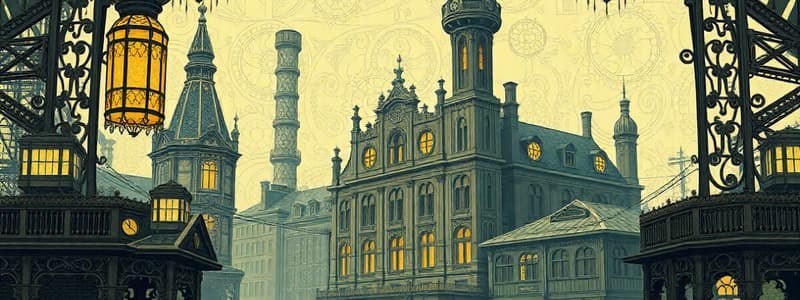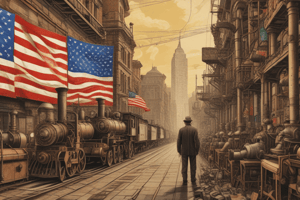Podcast
Questions and Answers
What event marked the end of the spread of Protestantism in northern France in 1572?
What event marked the end of the spread of Protestantism in northern France in 1572?
Adam Smith advocated for government control of the economy.
Adam Smith advocated for government control of the economy.
False
What are two significant benefits of industrialization?
What are two significant benefits of industrialization?
Economic growth and increased job availability
Capitalism is built around supply and demand, competition, and private ______ ownership.
Capitalism is built around supply and demand, competition, and private ______ ownership.
Signup and view all the answers
Match the following terms with their definitions:
Match the following terms with their definitions:
Signup and view all the answers
Which of the following is a negative aspect of industrial capitalism?
Which of the following is a negative aspect of industrial capitalism?
Signup and view all the answers
Marx and Engels believed that capitalism would eventually lead to a stable society without conflicts.
Marx and Engels believed that capitalism would eventually lead to a stable society without conflicts.
Signup and view all the answers
What did Charles Fourier envision as a model for society?
What did Charles Fourier envision as a model for society?
Signup and view all the answers
The _____ is the working class as defined by Marx.
The _____ is the working class as defined by Marx.
Signup and view all the answers
What was the key reason Marx believed in revolution?
What was the key reason Marx believed in revolution?
Signup and view all the answers
Agrarian socialism promotes industrialization as a means for achieve equality.
Agrarian socialism promotes industrialization as a means for achieve equality.
Signup and view all the answers
What does a democracy emphasize in governance?
What does a democracy emphasize in governance?
Signup and view all the answers
Which two countries divided the world's oceans through the Treaty of Tordesillas?
Which two countries divided the world's oceans through the Treaty of Tordesillas?
Signup and view all the answers
Dimitri Mendeleev moved from Russia to Germany to teach chemistry.
Dimitri Mendeleev moved from Russia to Germany to teach chemistry.
Signup and view all the answers
In which year did Martin Luther publish the 95 Thesis?
In which year did Martin Luther publish the 95 Thesis?
Signup and view all the answers
The ___________ were elite slave soldiers in the Ottoman Empire.
The ___________ were elite slave soldiers in the Ottoman Empire.
Signup and view all the answers
What did Martin Luther believe about free will?
What did Martin Luther believe about free will?
Signup and view all the answers
Match the following historical figures with their contributions:
Match the following historical figures with their contributions:
Signup and view all the answers
Women during the Industrial Revolution had no responsibilities at home.
Women during the Industrial Revolution had no responsibilities at home.
Signup and view all the answers
What approximate percentage of the indigenous population in Brazil perished during colonization from disease and war?
What approximate percentage of the indigenous population in Brazil perished during colonization from disease and war?
Signup and view all the answers
What was the estimated death toll of the Black Death in Europe during the mid-1300s?
What was the estimated death toll of the Black Death in Europe during the mid-1300s?
Signup and view all the answers
The Mughal Empire was founded by a ruler who was a descendant of Alexander the Great.
The Mughal Empire was founded by a ruler who was a descendant of Alexander the Great.
Signup and view all the answers
Who built the Taj Mahal?
Who built the Taj Mahal?
Signup and view all the answers
The __________ system in the Ottoman Empire allowed non-Muslim communities to manage their own religious laws and administrative affairs.
The __________ system in the Ottoman Empire allowed non-Muslim communities to manage their own religious laws and administrative affairs.
Signup and view all the answers
Match the following Mughal emperors with their notable contributions:
Match the following Mughal emperors with their notable contributions:
Signup and view all the answers
Which empire is known for having a complex but centralized government led by a Sultan?
Which empire is known for having a complex but centralized government led by a Sultan?
Signup and view all the answers
Under Aurangzeb's rule, India was united both politically and culturally.
Under Aurangzeb's rule, India was united both politically and culturally.
Signup and view all the answers
Which significant event marked the beginning of Russian imperial expansion during Ivan the Terrible's reign?
Which significant event marked the beginning of Russian imperial expansion during Ivan the Terrible's reign?
Signup and view all the answers
The first British East India Company was founded on __________.
The first British East India Company was founded on __________.
Signup and view all the answers
What was one of the key reasons for the decline of the Mughal Empire?
What was one of the key reasons for the decline of the Mughal Empire?
Signup and view all the answers
The Kul system in the Ottoman Empire included a social class of celibate military units loyal to the Sultan.
The Kul system in the Ottoman Empire included a social class of celibate military units loyal to the Sultan.
Signup and view all the answers
What was one major agricultural export of the Mughal Empire?
What was one major agricultural export of the Mughal Empire?
Signup and view all the answers
Catherine the Great was a significant ruler in __________ Russia.
Catherine the Great was a significant ruler in __________ Russia.
Signup and view all the answers
What was a primary goal of the mercantilist economic system?
What was a primary goal of the mercantilist economic system?
Signup and view all the answers
Martin Luther approved of the commercialization of indulgences.
Martin Luther approved of the commercialization of indulgences.
Signup and view all the answers
Who was the African leader known for his wealth in gold and significant economic impact during his pilgrimage?
Who was the African leader known for his wealth in gold and significant economic impact during his pilgrimage?
Signup and view all the answers
In the year ________, the Christian faith experienced a permanent split between the Eastern Orthodox and Catholic churches.
In the year ________, the Christian faith experienced a permanent split between the Eastern Orthodox and Catholic churches.
Signup and view all the answers
Match the following historical figures with their contributions or context:
Match the following historical figures with their contributions or context:
Signup and view all the answers
Which dynasty was established by the Mongols and Genghis Khan's grandson?
Which dynasty was established by the Mongols and Genghis Khan's grandson?
Signup and view all the answers
The Ottoman 'Millet System' was a means of discriminating against religious minorities.
The Ottoman 'Millet System' was a means of discriminating against religious minorities.
Signup and view all the answers
What industry made India the world's most powerful economy by 1700?
What industry made India the world's most powerful economy by 1700?
Signup and view all the answers
What was a major cause of the French Revolution?
What was a major cause of the French Revolution?
Signup and view all the answers
The French Revolution was characterized by the complete overthrow of the monarchy and imperial leadership.
The French Revolution was characterized by the complete overthrow of the monarchy and imperial leadership.
Signup and view all the answers
What was the Tennis Court Oath?
What was the Tennis Court Oath?
Signup and view all the answers
Maximilien Robespierre was a key figure during the __________.
Maximilien Robespierre was a key figure during the __________.
Signup and view all the answers
Match the following events with their corresponding descriptions:
Match the following events with their corresponding descriptions:
Signup and view all the answers
What did Napoleon create that influenced legal systems around the world?
What did Napoleon create that influenced legal systems around the world?
Signup and view all the answers
Simon Bolivar is known for promoting regional division in South America.
Simon Bolivar is known for promoting regional division in South America.
Signup and view all the answers
What did Napoleon attempt to achieve by invading Russia?
What did Napoleon attempt to achieve by invading Russia?
Signup and view all the answers
Napoleon's greatest military victory was the Battle of __________.
Napoleon's greatest military victory was the Battle of __________.
Signup and view all the answers
Which revolution succeeded in achieving its goals in 1848?
Which revolution succeeded in achieving its goals in 1848?
Signup and view all the answers
The revolutions of 1848 were largely successful and resulted in widespread democratic reforms.
The revolutions of 1848 were largely successful and resulted in widespread democratic reforms.
Signup and view all the answers
What is one reason why Napoleon's invasion of Russia failed?
What is one reason why Napoleon's invasion of Russia failed?
Signup and view all the answers
The primary aim of Simon Bolivar's efforts was __________.
The primary aim of Simon Bolivar's efforts was __________.
Signup and view all the answers
Match the following individuals with their contributions:
Match the following individuals with their contributions:
Signup and view all the answers
Study Notes
General Study Notes
- No specific text provided. Please provide the relevant text or questions for me to create study notes.
Studying That Suits You
Use AI to generate personalized quizzes and flashcards to suit your learning preferences.
Related Documents
Description
Test your knowledge on the evolution of capitalism, the impact of industrialization, and key historical figures such as Marx and Engels. This quiz covers significant events and concepts, including the spread of Protestantism and the structure of society under capitalism. Challenge yourself and see how well you understand these critical topics in economic history.




